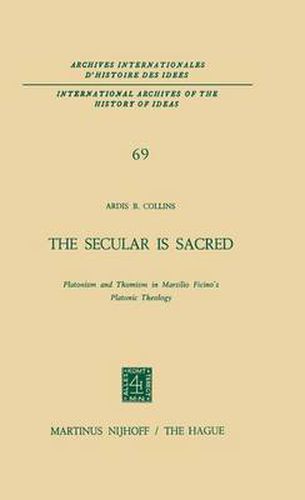Readings Newsletter
Become a Readings Member to make your shopping experience even easier.
Sign in or sign up for free!
You’re not far away from qualifying for FREE standard shipping within Australia
You’ve qualified for FREE standard shipping within Australia
The cart is loading…






This title is printed to order. This book may have been self-published. If so, we cannot guarantee the quality of the content. In the main most books will have gone through the editing process however some may not. We therefore suggest that you be aware of this before ordering this book. If in doubt check either the author or publisher’s details as we are unable to accept any returns unless they are faulty. Please contact us if you have any questions.
This book presents a philosophical position examined philosophically. Although it does not go beyond the confines ofFicino’s perspective and is governed by standards of historical accuracy, it makes explicit in its explanation ofFicino’s text the enduring philosophical questions which are at issue there. True, the book examines in some detail Ficino’s relation to his Platonic and Scholastic sources, and this is an issue of primary interest to those who study the history of culture or the his torical development of philosophy. However, in Ficino’s thought, this issue is also a philosophical issue. Ficino chooses Platonism as his guide because this philosophy retains an explicit and essential orientation to religion. When he takes Platonism as the primary instance of philoso phy, he is taking a stand on the nature of philosophy itself. Philosophy necessarily points toward the divinity and hence is necessarily related to the veneration and worship of its object. Christian theology joins Platonic philosophy in this movement toward God, developing more completely the implications of its fundamental insights. And the 1 splendor of Christian theology is Thomas Aquinas. Therefore, to examine the relationship between Platonism and Thomism in Ficino’s thought is to examine Ficino’s position on the unity of philosophy and theology. Scholars writing about Ficino have pointed to three major influences on his thought. The influence of Plato and the neo-Platonists, of course, is readily recognized.
$9.00 standard shipping within Australia
FREE standard shipping within Australia for orders over $100.00
Express & International shipping calculated at checkout
This title is printed to order. This book may have been self-published. If so, we cannot guarantee the quality of the content. In the main most books will have gone through the editing process however some may not. We therefore suggest that you be aware of this before ordering this book. If in doubt check either the author or publisher’s details as we are unable to accept any returns unless they are faulty. Please contact us if you have any questions.
This book presents a philosophical position examined philosophically. Although it does not go beyond the confines ofFicino’s perspective and is governed by standards of historical accuracy, it makes explicit in its explanation ofFicino’s text the enduring philosophical questions which are at issue there. True, the book examines in some detail Ficino’s relation to his Platonic and Scholastic sources, and this is an issue of primary interest to those who study the history of culture or the his torical development of philosophy. However, in Ficino’s thought, this issue is also a philosophical issue. Ficino chooses Platonism as his guide because this philosophy retains an explicit and essential orientation to religion. When he takes Platonism as the primary instance of philoso phy, he is taking a stand on the nature of philosophy itself. Philosophy necessarily points toward the divinity and hence is necessarily related to the veneration and worship of its object. Christian theology joins Platonic philosophy in this movement toward God, developing more completely the implications of its fundamental insights. And the 1 splendor of Christian theology is Thomas Aquinas. Therefore, to examine the relationship between Platonism and Thomism in Ficino’s thought is to examine Ficino’s position on the unity of philosophy and theology. Scholars writing about Ficino have pointed to three major influences on his thought. The influence of Plato and the neo-Platonists, of course, is readily recognized.